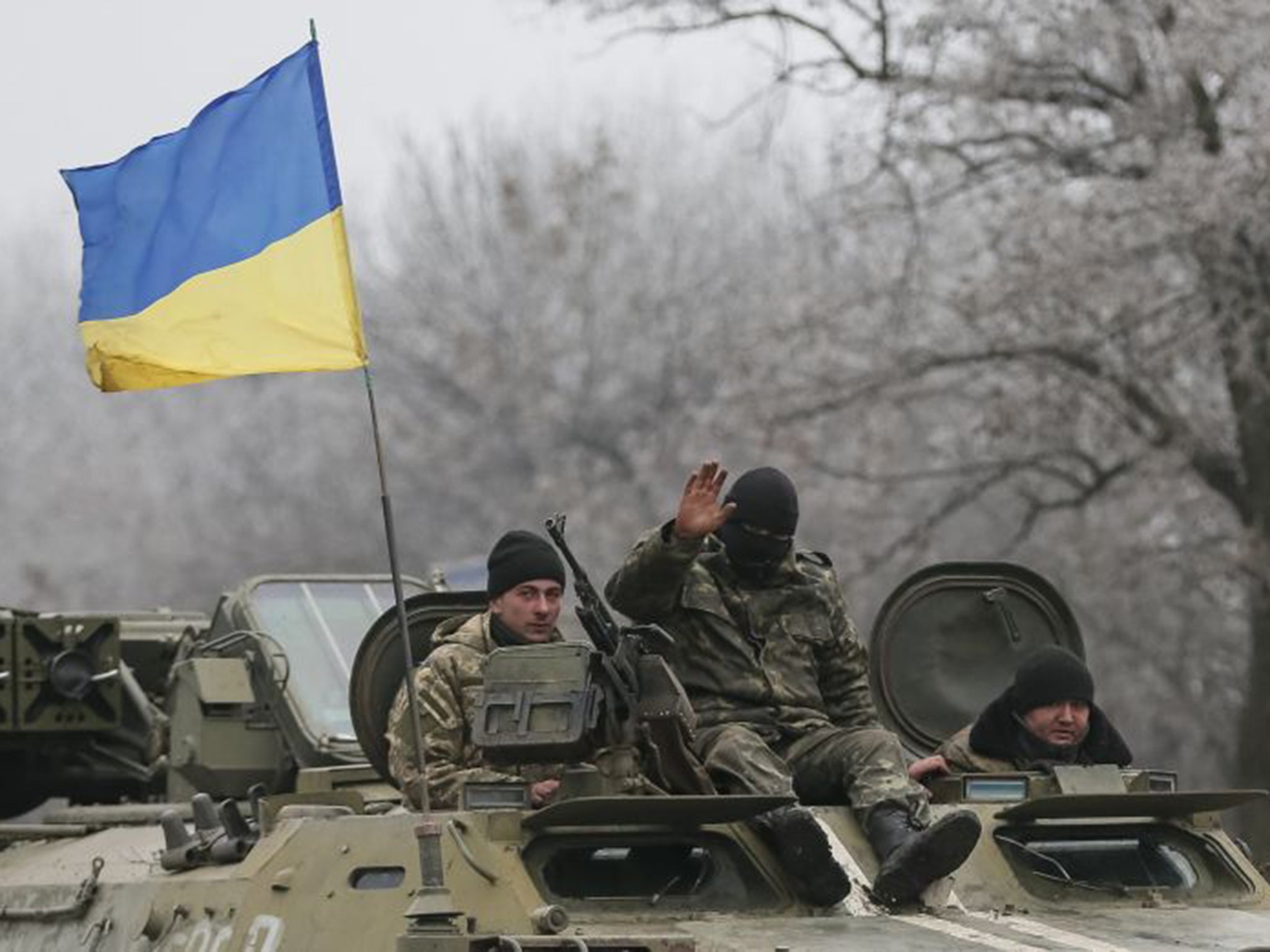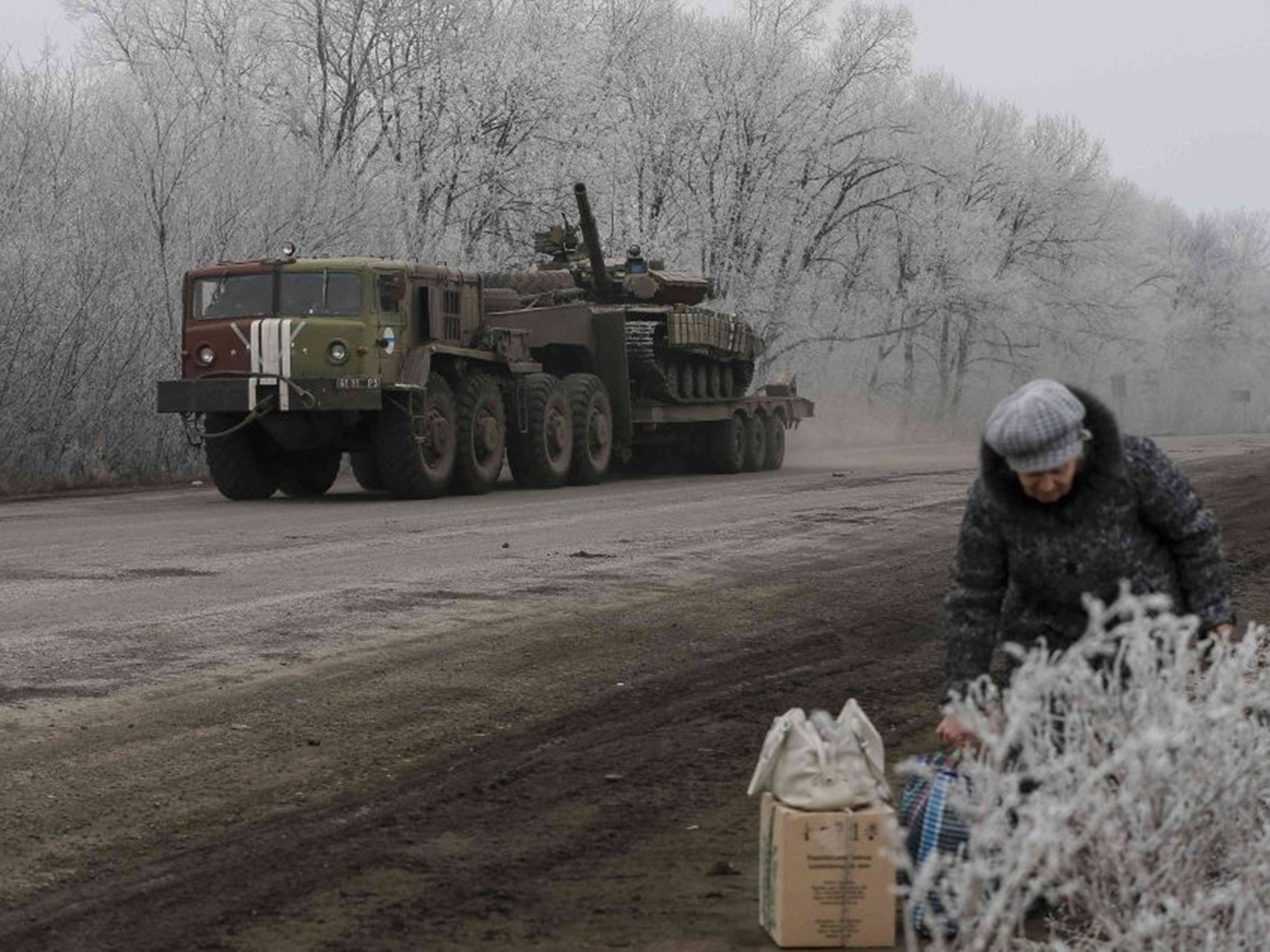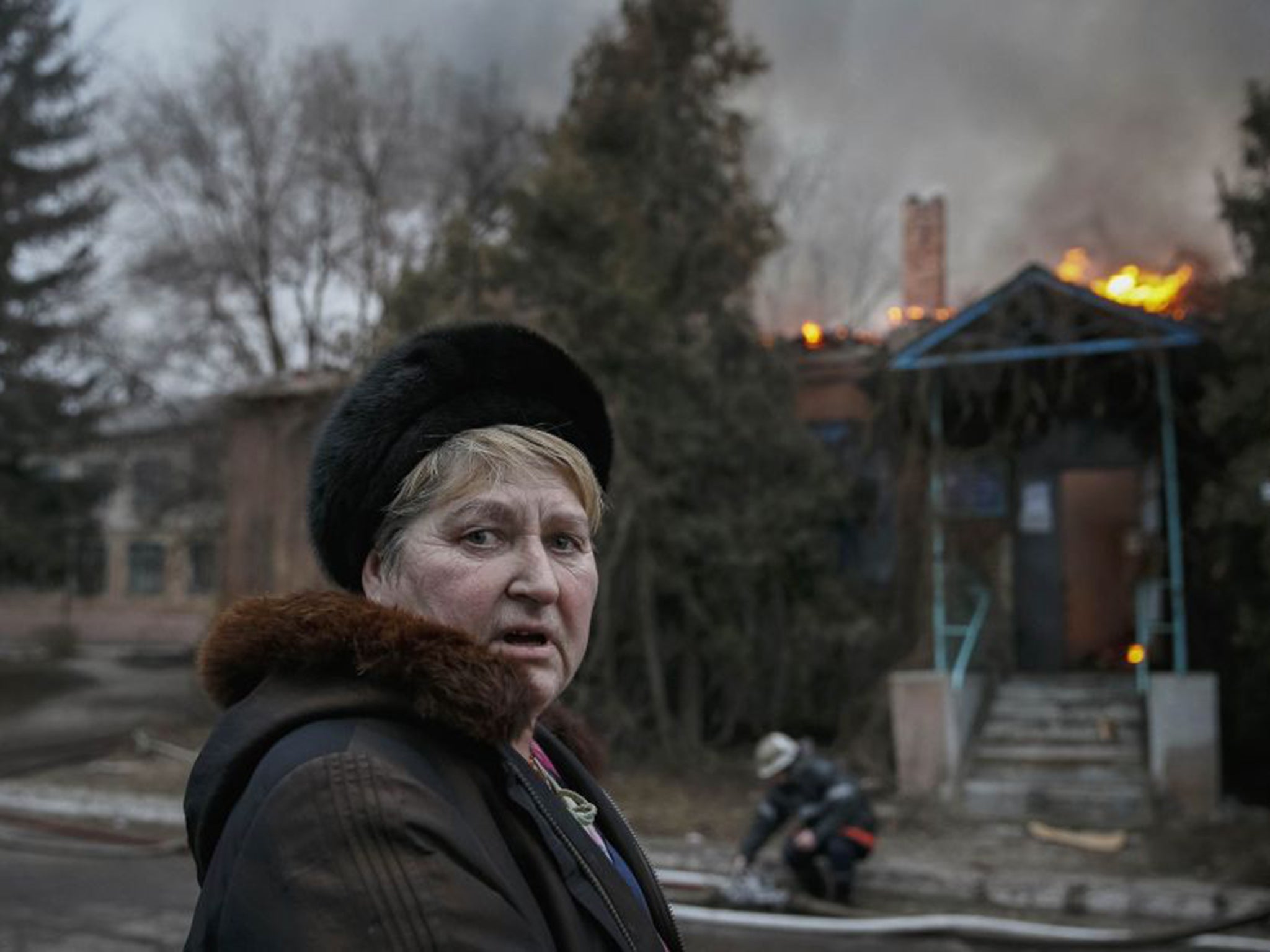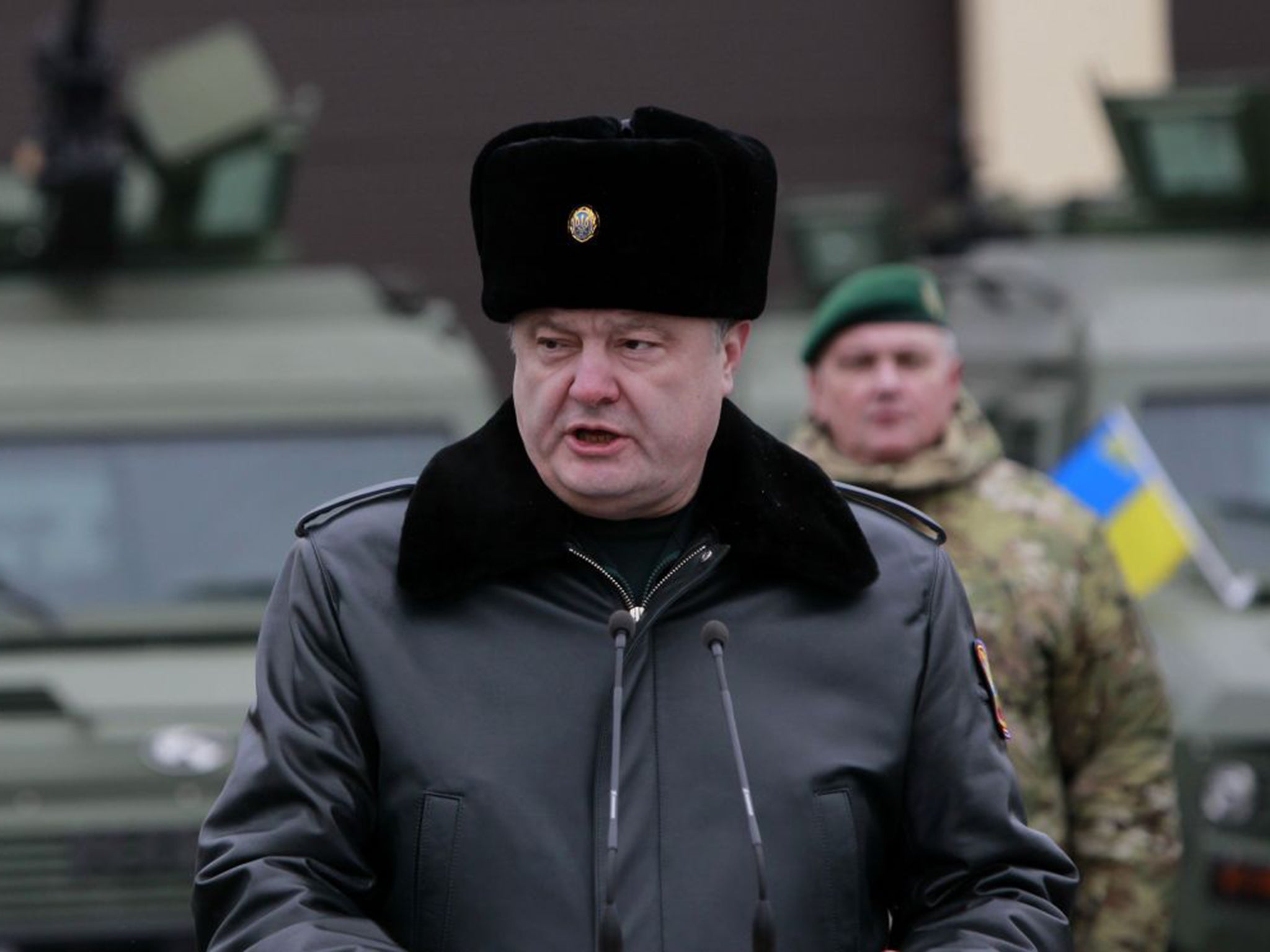Ukraine crisis: Ceasefire offers cold comfort to those caught up in the fighting
Fierce battles continued as the deadline approached, with most believing it would not last - if observed at all

Your support helps us to tell the story
As your White House correspondent, I ask the tough questions and seek the answers that matter.
Your support enables me to be in the room, pressing for transparency and accountability. Without your contributions, we wouldn't have the resources to challenge those in power.
Your donation makes it possible for us to keep doing this important work, keeping you informed every step of the way to the November election

Andrew Feinberg
White House Correspondent
A few miles out of Artyomovsk, there is a turn to the right. There, most civilian vehicles disappear, and the highway turns into a dramatic artery of war, with green diesel trucks, rocket launchers, missile transporters, armoured vehicles and tanks pulsate along the frozen road, over the hill towards the theatre of Debaltseve.
The town, a transport hub about 20 miles north east of Donetsk, has witnessed many of the battles in Ukraine’s bloody civil war. It was in the surrounding fields that the severed fuselage of the downed passenger jet Flight MH17 lay after being shot out of the sky – supposedly by rebel fighters.
Yesterday, on what many had hoped would be the last day of the civil war which has claimed more than 5,300 lives, it was again the centre of pitched battles.
Debaltseve is a key strategic link between separatist-held Luhansk and Donetsk. In recent days, Russian-backed separatists have been undertaking a serious attempt to encircle the town ahead of this morning’s promised ceasefire.
Phone networks are down in the area and the military has cut off roads immediately surrounding the fighting. Last night, however, it was clear that Ukrainian forces remained in control of the town and fighting continued in the surrounding villages, some of which have been changing hands on a daily basis.

Fierce battles were reported in Logvinovo, about five miles north west of Debaltseve. Russian-backed forces took control of the settlement earlier last week, creating serious supply and evacuation difficulties for the Ukrainians. Pyotr, a Ukrainian reconnaissance officer, said that infantry battles were continuing around the village. He did, however, claim government forces had been able re-establish supply routes along the road.
Fighting intensified in the hours leading up to the ceasefire, due to take effect in the first minutes of this morning. Kiev authorities said seven soldiers had been killed in one day. The prospect of a new ceasefire has provided hope in the region, but few on the ground in this, the most strategic of battlegrounds, believed it would last, if it is observed at all.
“If Russia says ceasefire, it means war,” said Oleg Voitekhovsky, a Ukrainian military medic and deputy commander of the National Guard medical company operating from Artyomovsk. Staring into the ground, he said life had been “pretty tough” over the past few days, with the company dealing, on average, with 100 injuries daily. The number of dead was “secret” information, he added.
Frontline medicine is a dangerous profession. Over the past week, Mr Voitekhovsky’s medical company says it has lost three vehicles and two medical teams during the fighting. Only two doctors returned from a group that set off from Debaltseve, with four medics missing, presumed prisoners of war.
On Thursday, an ambulance was blown up on a mine as it travelled along the highway to Debaltseve. The explosion projected one doctor some distance along the road, but this was to save him: after hiding in a bush, he was later able to make his way back to a Ukrainian base. There, he told soldiers that he had heard three shots, which he assumed to mean the end of at least three of his colleagues. Igor Ilkiv, the medic commander, believes the last medic may be in captivity.
Between chain-smoking, Mr Ilkiv spoke rapidly and nervously. He confused figures regularly, and lost patience with the journalists in front of him who asked for clarification. “Pay attention,” he shouted. The relentless flow of war casualties has prompted Mr Ilkiv’s medical team to convert an old clinic into an overflow base for the neighbouring hospital. The staff there yesterday appeared dedicated and busy, but the new facilities seemed more reminiscent of a hostel than a serious medical facility.
Mr Ilkiv said that his team had to deal with eight civilian casualties following a missile attack on the outskirts of the town on Friday. Of these, three were serious, and one had already been evacuated to a better-equipped hospital in Kharkiv.
It seemed clear that Friday’s attack included the use of what were described as “cluster bombs”. Seventeen submunitions were found scattered at the scene, two of which had failed to explode. At least three people died, including two children.

Missile disposal experts were still working at the scene yesterday, and medics believed the death toll will increase. “Ahead of midnight, rebels are trying to complete tactically important plans to enlarge the territory under their control,” said Ukrainian military spokesman Andriy Lysenko yesterday.
Meanwhile, officials in the port of Mariupol said an array of artillery attacks hit areas near the city yesterday morning. There was no immediate information on casualties. That came as the US ambassador to Ukraine, Geoffrey Pyatt, posted on Twitter what he said were satellite photos showing Russian artillery systems near the town of Lomuvatka, 12 miles north-east of Debaltseve.
Mr Ilkiv criticised the chaotic nature of the emergency response. “I’ve been in many humanitarian missions before and this was not how to do it,” he said. The area should have been cordoned off, he said, and only essential workers allowed in. “There were more than a dozen cars there – journalists, citizens, military, you name it. All it needed was a repeat attack and there would have been carnage.”
Municipal, medical and military authorities met late on Friday night to discuss co-ordinating the emergency response better, Mr Ilkiv added. Ukraine’s President Petro Poroshenko yesterday warned that if the ceasefire agreed in Minsk last week fails, he would introduce martial law across the country.

“Even before Minsk, I warned that we will have to, if there is no peace, take a very difficult but necessary decision to introduce martial law,” he said. “I stress, once again, that in this case the martial law will be introduced not just in Donetsk and Luhansk, but in the whole country.”
Some semblance of ordinary life had returned to Artyomovsk on Friday: women pushed prams; teenagers played football; the restaurants were full. But Lena Petukhova, owner of a flower shop, said people were still scared. “We hadn’t seen any serious fighting here since the summer,” she said. “Then, it was certainly frightening: street-to-street stuff. People died. But now we’re dealing with cluster bombs! You’re walking along the street and you don’t know what will fall on you.”
As she put the finishing touches to a Valentine’s Day bouquet, Ms Petukhova said business was down but a few customers had come through the doors all the same. “People want to believe in the future,” she said. “Love is stronger than war.”
Subscribe to Independent Premium to bookmark this article
Want to bookmark your favourite articles and stories to read or reference later? Start your Independent Premium subscription today.
Join our commenting forum
Join thought-provoking conversations, follow other Independent readers and see their replies
Comments